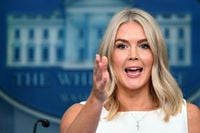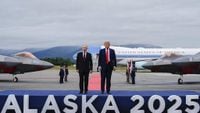White House press secretary Karoline Leavitt took center stage this week, offering spirited defenses of President Donald Trump’s recent diplomatic efforts and controversial statements on U.S. election policy. In a flurry of back-to-back briefings and interviews, Leavitt addressed mounting questions about the administration’s high-stakes Russia-Ukraine peace push and Trump’s renewed call to end mail-in ballots. The events, which unfolded over several tense days in Washington, have drawn sharp reactions from both domestic and international observers, as well as the press corps itself.
On August 22, 2025, Leavitt faced the White House press corps to address two of the most pressing issues on the administration’s agenda. At the top of the list: President Trump’s ongoing attempts to broker a peace deal between Russia and Ukraine, a conflict that has gripped global attention for years. According to ABC News, Leavitt criticized what she described as negative coverage of the president’s recent summit with Russian President Vladimir Putin, held in Alaska, and subsequent talks with Ukrainian President Volodymyr Zelensky and a cadre of European leaders in Washington, D.C.
Leavitt confirmed that Putin had agreed to a one-on-one meeting with Zelensky—a development she called a major step forward for a Trump-brokered peace. “He has, and I just answered that question for you,” Leavitt told a reporter who pressed for confirmation of Putin’s commitment to meet with Zelensky in the coming weeks. This announcement was particularly significant, given that the Kremlin had been elusive about what exactly Putin had promised the U.S. president. The Russians, for their part, struck a more cautious tone. Russian Foreign Minister Sergey Lavrov described the process as “step by step, gradually, starting from the expert level and then going through all the necessary stages,” as reported by BBC and other outlets.
The White House summit on August 18, 2025, brought together an impressive roster of international leaders: British Prime Minister Keir Starmer, European Commission President Ursula Von der Leyen, French President Emmanuel Macron, Italian Prime Minister Giorgia Meloni, and German Chancellor Friedrich Merz. Their visit to Washington underscored the urgency and gravity of the ongoing conflict—and the world’s hope for a negotiated settlement.
After a lengthy meeting with Zelensky and the European leaders, President Trump excused himself to update Putin on the day’s progress. The next morning, in a Fox & Friends interview, Trump explained his decision: “I felt it would be disrespectful to make the call in the middle of the meeting with Zelensky and the European leaders.” When a New York Times reporter questioned why the president didn’t simply make the call with Putin in the same room as the other leaders, Leavitt fired back: “With all due respect, only a reporter from the New York Times would ask a question like that, Sean.”
Trump himself took to social media on August 18 to share his perspective: “At the conclusion of the meetings, I called President Putin, and began the arrangements for a meeting, at a location to be determined, between President Putin and President Zelensky.” The message signaled Trump’s confidence that direct dialogue between the two adversaries was the only viable path to peace. “It takes, in this case, two to tango, they have to have a relationship otherwise we’re just wasting our time,” he said on August 18, reinforcing his belief that personal engagement is key to resolving the war.
Leavitt was quick to defend the administration’s approach, scolding the press for what she called “highly productive” talks that had been unfairly maligned in coverage. She argued that the meeting’s success was evident in the fact that Zelensky and other world leaders “flew to Washington, D.C., immediately to discuss the details.” According to CNN, Leavitt emphasized that Trump “learned a lot” during his meeting with Putin and highlighted the importance of open dialogue between both the Ukrainians and the Russians.
As the diplomatic drama played out, Leavitt also took aim at former President Joe Biden’s foreign policy, accusing him of pushing an “America last foreign policy” that failed to keep the door open for peace. “President Trump rejected that failed approach, and instead, over the last seven months, has relentlessly pursued peace throughout his second term,” she asserted, as reported by Reuters. The contrast, she argued, could not be clearer: Trump’s administration, she said, was committed to “relentlessly” pursuing peace, even as critics questioned the wisdom and timing of his overtures to Moscow.
While the foreign policy front dominated headlines, another contentious issue surfaced: Trump’s renewed call to end mail-in ballots in U.S. elections. In a separate exchange on August 22, Leavitt was pressed by a reporter about the president’s position, especially given that states—not the federal government—govern the rules around election methods. Leavitt didn’t offer a direct answer but signaled that the topic was on the agenda. “Congress comes back to Washington, I’m sure there will be many discussions with our friends on Capitol Hill and also our friends in state legislatures across the country to ensure that we’re protecting the integrity of the vote, for the American people,” she said, as quoted by ABC News.
Trump’s claims about widespread fraud in mail-in voting have long been a source of controversy. However, as The Associated Press and NPR have repeatedly reported, there has been no credible evidence to support these allegations. Courts, election offices, audits, and other security checks have consistently refuted claims of systematic mail voting fraud. Studies show that fraud in mail-ballot voting is rare, and in the few instances where it has occurred, perpetrators have been punished and the votes never counted. This reality has fueled criticism from both political opponents and nonpartisan election experts, who warn that undermining confidence in mail-in ballots could have lasting consequences for American democracy.
Despite the lack of evidence, Leavitt’s comments suggest that the issue remains very much alive in the halls of power. She indicated that both Congress and state legislatures would “take a look” at mail-in ballots, hinting at possible legislative or regulatory changes ahead. This prospect has already sparked heated debate, with some lawmakers vowing to defend access to mail-in voting as a safeguard for voter participation, while others echo Trump’s calls for tighter controls in the name of election security.
The twin controversies—one international, one domestic—underscore the high-wire act facing the Trump administration as it navigates a world still reeling from war and a nation deeply divided over how it chooses its leaders. Leavitt’s combative exchanges with the press reflect the administration’s determination to shape the narrative, even as facts and public opinion sometimes seem to pull in different directions.
As the world watches for signs of real progress on the Russia-Ukraine front, and as U.S. lawmakers prepare to revisit the rules that govern American elections, the stakes could hardly be higher. Whether Trump’s efforts will yield lasting peace or lasting controversy remains to be seen, but for now, the White House is making it clear that it intends to press forward on both fronts—undaunted by criticism, and determined to leave its mark.


